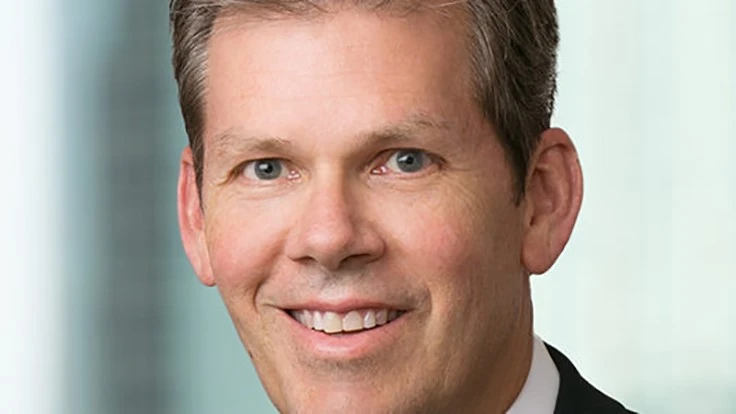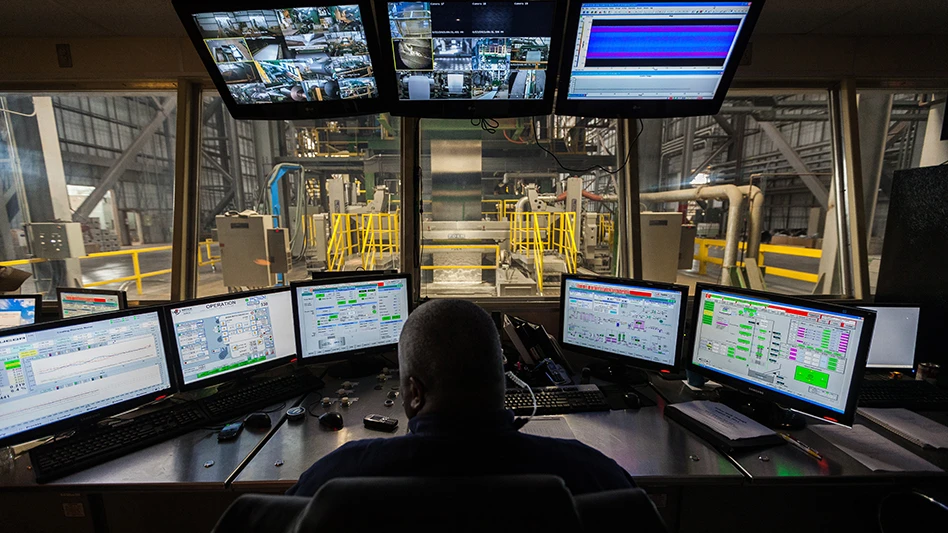
Waste Management, Houston, announced its first quarter earnings April 25. Here are some highlights of the report and the subsequent earnings call with CEO Jim Fish.
- Revenues for the first quarter of 2019 were $3.70 billion compared with $3.51 billion for the same 2018 period. Net income for the quarter was $347 million, or $0.81 per diluted share, compared with $396 million, or $0.91 per diluted share, for the first quarter of 2018. On an adjusted basis in the first quarter of 2019, net income was $402 million, or $0.94 per diluted share.
- As a percent of revenue, total company operating expenses were 62.2 percent in both the first quarter of 2019 and 2018. The company’s focus on improving efficiency in its collection business, controlling costs and maintaining discipline in its pricing programs delivered margin expansion sufficient to offset an 80-basis point headwind from federal natural gas fuel credits received in 2018.
- Cash from operations were up $890 million, a 10 percent increase from the same period last year. Workday adjusted volumes were also up 4 percent year over year.
- An 8.1 percent churn for the period represented the company’s best performance in 3 years.
- Landfill municipal solid waste yield was up 3.4 percent, which is the highest it’s been for the company in a decade.
- The company’s certified sites improved maintenance cost per unit by about 6 percent on a year-over-year basis.
Fish on the company’s financial performance:
“The strong results we generated in the first quarter demonstrate that delivering an outstanding customer experience and focusing on continuous improvement produce solid growth in our business. In the first quarter, we saw organic revenue growth of more than 6 percent in our collection and disposal business, which translated into about a 7 percent increase in operating EBITDA in that business. More importantly, this strong operational performance resulted in net cash provided by operating activities increasing by 10 percent when compared to 2018.
“The focus and discipline of our employees continue to drive exceptional results. That discipline is also evident in our recycling line of business, where the steps we took to improve the business increased operating EBITDA by $11 million when compared to the first quarter of 2018, despite a 28 percent decline in recycling commodity prices. The great start to 2019 puts us well on our way to meeting our targets for the full year.”
On the recent blockbuster acquisition of Advanced Disposal Services (ADS):
“We are very, very excited about this. We haven't done, in a period of 20 years, a deal of this size. We can't say a whole lot about some of the details of it for obvious reasons. … We'll give details where we can, but suffice to say, this is being looked at as being transformational. And the two companies are so complementary from a cultural standpoint that it really makes a ton of sense for us.”
Fish continued, “We are joining two teams of dedicated employees who are passionate about helping to manage the environmental needs of customers and communities with outstanding service and a commitment to safety.”
On what the ADS acquisition means for the company financially:
“The acquisition advances our growth strategy and aligns with our financial goals, including growth and earnings per share and margins and free cashflow. It will bring to Waste Management a high-quality complementary asset network and customer base in both new and existing areas across the eastern half of the United States.
On what it means to acquire ACS’ customers:
“The other thing I would say about it is strategically, it's such a nice fit for us. I’d say we're looking at this as 3 million customers that we bring in [where] we can add our focus on the customer, [where] we can add our focus on digital technology. All of that fits very nicely into our strategy, and it's 3 million customers who honestly… it’s lot more difficult to get 3 million organic customers than it is to fix them up through a great acquisition like this. But it is, in effect, the same end result, which is we bring our processes, we bring our technology, we bring our focus on the customer to a big batch of new customers.”
On what the acquisition means for investors:
“We're enthusiastic about this catalyst for long-term value creation for our shareholders in 2020 and beyond. We believe we can leverage benefits of the investments we're making in technology and people to achieve enhanced efficiency across the ADS network in the coming years. ADS has talented and dedicated employees and we look forward to capitalizing on the strengths of both organizations.”
On Waste Management’s focus on driver training and safety:
“To enhance our performance, we're investing in the same areas that helped make us successful in 2018, our people, technology, asset network and the customer. As we've mentioned in the past, we're opening our second state-of-the-art driver and technician training center, extending our commitment to providing centralized training for our drivers and technicians across the organization.
“Participating in this training not only helps improve retention, it helps make our employees safer. In the first quarter, we saw a meaningful reduction in safety incidents of drivers with less than a year of experience. Focusing on our on-boarding process for new drivers is clearly paying off.”
On improving the company’s engagement with its customers:
“We also made strides with respect to technologies. We launched a new online buying experience for U.S. commercial and industrial customers. This followed the rollout of a similar online tool for open market residential customers last fall. Engaging with our customers in their channel of choice helps to differentiate our customer experiences and is driving measurable volume increases.”
On dealing with challenges with recycling:
“I have two comments on recycling. First of all, we said it for a number of quarters, and that is that it demonstrates how strongly our core operations are exclusive of recycling that we can continue quarter-after-quarter to have these really good [financial] results in the face of … 10-year lows from a commodity standpoint. So, the rest of our business is really operating well. A lot of you have reported on that and that is absolutely the case.
“The second thing I'll say is we're not just sitting back—here's what's going on in recycling. There's real extreme supply and demand imbalance, and we talked about China a lot, so I won't go into details on that. But there is a really extreme supply and demand imbalance. So, for us, we feel strategically it doesn't make sense for us to sit back and rely on the rest of the world literally to try and figure this out.
“So that's why we talked about it last quarter, maybe the quarter before, that we're building what we call a ‘recycling plant of the future’ to address some of this downturn in the market on our own. So, that recycle plant of the future, that's going up in Chicago and will be starting to take materials sometime in Q3 or Q4. We believe we’ll significantly reduce operating cost at that plant because the technology that we're putting in. [We’re putting in] a lot of optical technology in that plant.
“So, we think it will be a very different plant in terms of operating cost. And that's part of our answer to try to address this downturn in the business that really, we don't have much control over and don’t have much view of when it will resolve itself. So, we're going to try and fix something that we control on our own.”
On finding new markets for recyclables in the wake of National Sword:
“China, two years ago, 27 percent of all of our recyclables were going [there; now, it’s] 3 percent in a period of 18 months. When that customer [drops] out, you're going to have a real oversupply condition. And we've tried to move [our material around to new markets]. So, a lot of it has gone to the United States.
“Actually, 63 percent of all of our commodities stayed domestic two years ago. It's now 77 percent. Some of it's been replaced in Southeast Asia, which has gone from like 1 percent to 7 percent. So, we've done a good job of finding other homes, but there is going to be this big supply and then demand imbalance, too. I mean, part of the issue is demand and that means that companies will have to use a higher percentage of recycled material in their products.
“And today, that has not been the case. So there [is a need to] find other uses for low-value recyclables. … We're optimistic that over time, this [will] really balance out. But as I said earlier, we're not willing to just sit back and let it balance itself out and see this as a kind of a low-margin, low-return business over a period of years.
“So that's why we're investing in things like this recycling plant of the future that takes a considerable amount of cost out [of the equation], and operates at as much as 30 percent or 40 percent lower unit costs than our current single stream [plants].
On what the recent acquisition of Petro Waste means for the company:
“The Petro Waste acquisition really for us is very strategic, particularly as it relates to geography. I mean, if you're going to make a commitment to be in this energy services space, you have to be in the eye [of it], which is the Permian Basin.
“And we had a very small presence in the Permian Basin. This gives us a much more important presence [there]. … It is largely a landfill acquisition. So, we look at it as being core to what we do every day, and so, we're very good at it. We're feeling confident that that this business will immediately be accretive for us. But when we bought it, we recognized that because it's an area that we really didn't have landfills at … it has to be purchased based on the fact that it was a reasonable multiple, not one that is supplemented by synergies.
“There really weren't any synergies with it. We're very confident that we got it at a good price, that it's right down the middle of the fairway for us in terms of [relating to] landfills, and it's in the best location if you're going to be in this space in the United States.”
Latest from Construction & Demolition Recycling
- Hendrickson to build a solar farm to power bumper plant
- McCloskey dealer in Canada adds to geographic reach
- Atlas, Mantsinen lines now available at Mid-Atlantic Komatsu locations
- Sims announces investments in Virginia
- NWRA submits comment on OSHA heat rules
- Brokk named North American distributor for Darda
- RMDAS figures portray US recycled steel price boost
- Rice Lake unveils in-motion truck scale system





